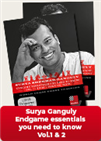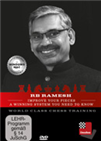An international conference
These conferences are significant because they provide a platform to explore the relationship between chess, cognitive science and education; as well as to understand the importance of chess in the development of skills such as planning, decision-making and problem-solving.
From 15:00 CET on 18 May, we will be holding — via online — the conference named: “Chess in Education - Methodology and perspectives”. This activity is organised by the Armenian State Pedagogical University (ASPU), the Chess Scientific Research Institute and the Kasparov Chess Foundation, and led by our colleague GM Smbat Lputian.
 In this video course, GM Surya Ganguly joins IM Sagar Shah and drawing from his colossal experience, shares some uncommon endgame wisdom. The material mostly features positions with rook against rook and a pawn, and starts by covering the fundamentals.
In this video course, GM Surya Ganguly joins IM Sagar Shah and drawing from his colossal experience, shares some uncommon endgame wisdom. The material mostly features positions with rook against rook and a pawn, and starts by covering the fundamentals.Master Lputian and his team have made an effort to include participants from Spanish-speaking countries; a provision that I have thanked him from the knowledge of the needs of training, training and updating of our teachers and instructors from Latin America.
In my opinion, participating in this type of experience is fundamental due to the benefits that this activity offers in terms of our professional training. These conferences provide a platform to explore the relationship between chess, cognitive science and education; as well as to understand the importance of chess in the development of skills such as planning, reasoning, problem-solving and emotional intelligence.
Furthermore, I understand that chess is not only an effective educational tool, but also fosters belonging to a cultural community, an ecosystem that, in this 21st century, is global in nature.
Finally, and from a broader perspective, participation in these conferences not only enriches knowledge about chess and its applications, but also contributes to the promotion of educational chess projects in our governments.
That is why I invite you to read the promotion of this interesting conference so that, from your experience, you can accompany us through some of the options it offers us.
Armenian State Pedagogical University
Chess Scientific Research Institute
Kasparov Chess
Conference: Chess in Education. Methodology and Prospects
Invitation
On May 18, 2024, at 15:00 CET, the Armenian State Pedagogical University (ASPU), the Chess Scientific Research Institute, and the Kasparov Chess Foundation will hold an international conference “Chess in Education Methology and Prospects”.
The purpose of the conference is to share ideas about the challenges of integrating chess in the education system and possible solutions.
The conference will be held on the Zoom online video platform.
Conference Organizers
Organizing Committee
- Prof. Srbuhi Gevorgyan
- Michael Khodarkovsky, President of the Kasparov Chess Foundation
- GM Smbat Lputyan
- GM Alex Onischuk
- Dr. Mariam Ispiryan
- Dr. Jeff Day
- Dr. Vahan Sargsyan
Conference Themes
- Effective chess learning methods
- Teaching chess to people with special educational needs
- Chess in the preschool education system
- Chess teacher training and professional development
The conference program includes plenary sessions and a round table discussion.
Publishing
According to the conference results, it is planned to publish “Chess in Education, Methodology and Prospects” conference materials.
The languages spoken at the conference are English and Spanish.
Forms of Participation
- As a speaker, with the publication of an article in conference proceedings
- As a listener, with or without publishing an article in the conference proceedings
To register as a speaker for the scientific conference, please submit papers by April 1, 2024 (https://forms.gle/6ckHqHnQumvbCvfR9).
The editorial board will confirm acceptance or rejection of the papers by April 10, 2024. Please see below for more details.
Report Requirements
 In this course, we will learn how to identify passively placed pieces in any given situation and how to improve their health by bringing them into active squares.
In this course, we will learn how to identify passively placed pieces in any given situation and how to improve their health by bringing them into active squares.The text of the report should be submitted in MS Word format. The structure of the report should contain the following:
Introduction
- problem statement
- historical background of the problem
Research Program
- purpose and hypothesis of the study
- stages of research
- description of the sample: number of participants, gender, age, and other
- characteristics[1]
- methods and techniques with their description
- implementation of the procedures
Results
- description of results (with tables and graphs)
- discussion of results
Conclusions
Technical Requirements
Manuscript Submission Guidelines:
- must be submitted in English and Spanish
- printed and in electronic versions: the author is obliged to guarantee the compliance of the manuscript to the topics of the periodical and provide the final copyright version
- in Microsoft Office Word (*.docx or *.doc)
- page size - A4
- font face - Times New Roman
- footnotes should be given at the bottom of the page, references - at the end of the article
- font size for the text of the article - 12, for the footnotes - 10
- line spacing for the text of the article - 1.3, for the footnotes – 1, first line - 0.8 cm
Article Length
- not longer than 3000 words
Article Title
- should outline the general scope of the article and not exceed eight words
- uppercase
- font size-12
Authors’ Data
- first name(s), last name(s), and CVs of the manuscript author(s)
- full name and postal address of each author’s workplace, organization
- position, rank, academic degree
- e-mail and phone number
- the surnames and the first letter in names of authors should be full and in uppercase
Abstract
- should not exceed 200 words
- should be informative and not contain general words and phrases
- the abstract should describe the research and the results
- should reflect the main content of the article taking into consideration the following
- viewpoints: subject, purpose, research results and conclusions
- information contained in the title should not be duplicated in the abstract
- the abstract should provide a good perspective on the final message of the article
Introduction should
- reflect the article’s contribution to the scopes of philosophy and methodology of science
- reflect the current concerns in the area
- specify the research objectives
Conclusions
- should be clearly formulated and presented
Keywords
- should be up to ten
- should be separated by a comma
References
- The manuscript should be constructed according to the APA citation System. For instance: (Toulmin, 1958, pp. 56-57) (Hilbert & Bernays, 1934).
- When submitting materials, the cover letter must specify the intended conference for publication.
- The conference will be held on an online platform.
- All participants will receive certificates corresponding to the participation format.
- The scientific conference is free.
Terms of Participation
To participate as a speaker at the conference, please submit an electronic application (https://forms.gle/6ckHqHnQumvbCvfR9). The link to join as a listener will be postedlater. Chess Scientific Research Institute website: https://chesstudy.com/
Contact information of the organizing committee
- Organizing committee: chess@aspu.am
- The organizing committee will review the abstracts of the submitted paper to determine their acceptance in the conference program.
- If accepted, reports must be prepared and submitted as a video presentation by May 5.
- The allocated time for the video presentation should be at most 10 minutes.
[1] Optional for empirical research
Links























